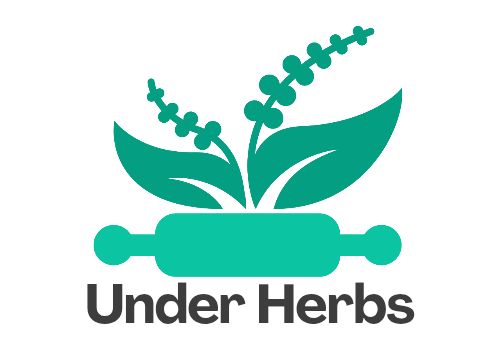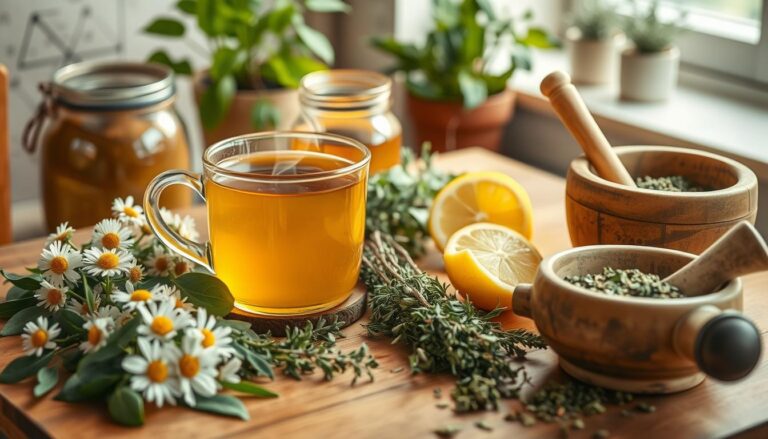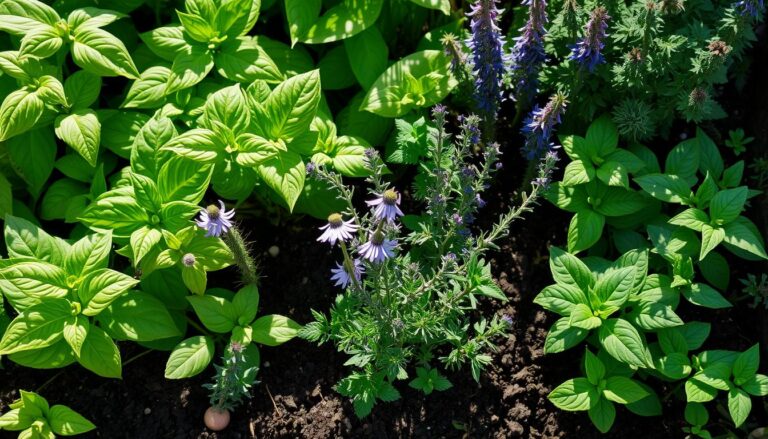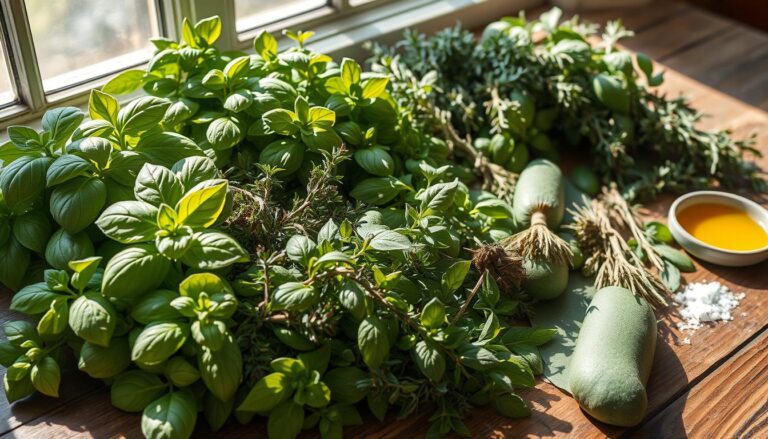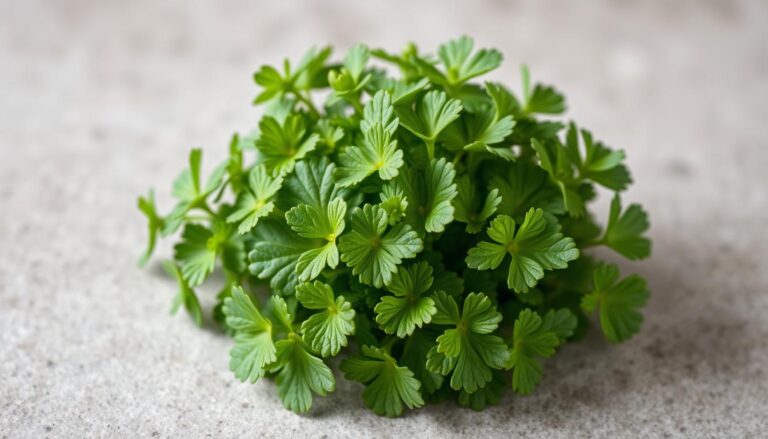Exploring the Science of Herbal Medicine: Does It Work?
Have you ever wondered if herbal remedies really work? For centuries, people from different cultures have used herbal medicine for health and wellness.

Now, modern research is proving some of these traditional uses. It’s showing the evidence-based herbal medicine and its benefits. As you look into natural remedies, it’s key to know about the latest natural remedies research and how it affects your health.
Key Takeaways
- Herbal medicine has a rich history across various cultures.
- Modern research is validating traditional uses of herbal remedies.
- Understanding evidence-based herbal medicine is crucial.
- Natural remedies research continues to uncover new benefits.
- It’s essential to stay informed about the efficacy and safety of herbal medicine.
The Historical Roots of Herbal Medicine
Using plants for medicine goes back to ancient times. People all over the world have used herbs for health. For thousands of years, herbal medicine has been key to health care, shaped by many cultures.
Ancient Healing Traditions Across Civilizations
Different cultures have added to herbal medicine’s rich history. For example, Traditional Chinese Medicine (TCM) has been around for over 3000 years. The “Divine Farmer’s Classic of Herbalism” is one of the oldest herbal texts.
Ancient Egyptians, Greeks, and Romans also used herbs. They documented their knowledge in texts that still guide us today.
How Traditional Knowledge Has Shaped Modern Herbalism
Traditional herbal knowledge has greatly influenced modern herbalism. Today’s herbal practices and products come from ancient remedies. Our understanding of how plants work with our bodies has grown, but the core knowledge is still from the past.
Key Historical Texts and Their Influence
Old texts have been vital in herbal medicine’s growth. “The Divine Farmer’s Classic of Herbalism” listed many herbs and how to use them. These texts have helped keep traditional knowledge alive and still shape our herbal practices today.
| Civilization | Notable Text | Contribution |
|---|---|---|
| Chinese | The Divine Farmer’s Classic of Herbalism | Cataloged numerous herbs and their uses |
| Egyptian | Ebers Papyrus | Documented herbal remedies and medical practices |
| Greek | De Materia Medica by Dioscorides | Described the medicinal properties of plants |
The Science Behind Herbal Medicine: Does It Really Work
Exploring herbal medicine shows us a world of bioactive compounds. These compounds affect our bodies in many ways. To see if herbal remedies work, we must look at how they interact with us.
Understanding Phytochemicals and Bioactive Compounds
Phytochemicals are compounds in plants that help us. They are found in different parts of plants and have health benefits. For example, curcumin in turmeric fights inflammation.
Plants have many types of phytochemicals. These compounds are in leaves, roots, and flowers. Each part has its own health benefits.

How Plant Compounds Interact with Human Physiology
Phytochemicals work in complex ways with our bodies. They can change how our cells work. Some act as antioxidants, fighting off harmful free radicals.
The Entourage Effect: Why Whole Plants Matter
The “entourage effect” is when plant compounds work together. This makes the plant more effective. Studies show that using whole plants works better than just one compound.
| Compound | Plant Source | Potential Health Benefit |
|---|---|---|
| Curcumin | Turmeric | Anti-inflammatory |
| Ginkgo biloba extract | Ginkgo biloba | Cognitive enhancement |
| Valerenic acid | Valerian root | Sleep improvement |
Learning about herbal medicine helps us use it wisely. By understanding how phytochemicals work, we see their benefits and limits.
How Scientific Research Evaluates Herbal Effectiveness
Scientists use modern methods to check if herbal remedies work. They test these natural remedies carefully. This ensures the results are trustworthy for everyone.
Modern Clinical Trial Methodologies
Clinical trials are key in testing herbal medicines. They aim to remove bias and show if treatments work. Randomized controlled trials (RCTs) are especially useful. They randomly split people into groups to reduce bias.
For example, a trial might look at a herbal supplement’s effect on health. People get either the supplement or a fake one. Then, their health is tracked. This helps figure out if the herbal remedy is safe and effective.
The Evidence Hierarchy in Herbal Medicine
Researchers follow a hierarchy of evidence for herbal medicine. At the top are systematic reviews and meta-analyses of RCTs. These give the strongest evidence. Systematic reviews gather and combine research, while meta-analyses sum up many studies’ findings.
“The evidence-based approach to herbal medicine involves critically evaluating the available research to guide clinical practice.”Dr. John Smith, Herbal Medicine Researcher
Limitations of Current Research Approaches
Even with better trials, herbal medicine research faces challenges. Herbal products are complex, with many active compounds. This makes it hard to standardize and pinpoint the active ingredients.
| Research Approach | Strengths | Limitations |
|---|---|---|
| Randomized Controlled Trials | High reliability, minimizes bias | Can be costly, may not reflect real-world use |
| Systematic Reviews | Comprehensive, synthesizes existing evidence | Quality depends on the quality of included studies |
| Meta-Analyses | Provides statistical power to detect effects | Can be affected by publication bias |
Knowing the limits of research is key. As methods improve, the evidence for herbal medicine will grow. This will help doctors and patients make better choices.
7 Scientifically-Backed Herbal Remedies Worth Trying
In recent years, science has shown that many herbal remedies work. This gives us a better understanding of their benefits. Several herbal supplements have strong evidence to support their use.
St. John’s Wort: The Evidence for Depression Relief
St. John’s Wort has been studied a lot for treating mild to moderate depression. Clinical trials suggest it can work as well as regular antidepressants for some people. But, results can vary.
Ginkgo Biloba: Cognitive Benefits and Circulation
Ginkgo Biloba is known for boosting memory and focus. It may also improve blood flow to the brain. This makes it effective for some.

Echinacea: Immune Support Research Findings
Echinacea is popular for boosting the immune system. Studies show mixed results. But, some evidence suggests it can shorten and lessen colds.
Turmeric and Curcumin: Anti-inflammatory Powerhouses
Turmeric, especially curcumin, fights inflammation well. Research has highlighted its ability to manage chronic inflammation.
| Herbal Remedy | Primary Use | Key Findings |
|---|---|---|
| St. John’s Wort | Depression Relief | Effective for mild to moderate depression |
| Ginkgo Biloba | Cognitive Function | Improves memory and circulation |
| Echinacea | Immune Support | May reduce cold duration and severity |
| Turmeric/Curcumin | Anti-inflammatory | Potent anti-inflammatory effects |
| Valerian Root | Sleep Aid | Improves sleep quality |
| Milk Thistle | Liver Protection | Antioxidant properties |
| Ginger | Digestive Aid | Relieves nausea and digestive issues |
Valerian Root: A Natural Sleep Aid with Clinical Support
Valerian root is known for helping with sleep. Studies show it can cut down on time to fall asleep and improve sleep quality.
Milk Thistle: Liver Protection Properties
Milk Thistle is good for the liver. Its active part, silymarin, has antioxidants. This could help protect the liver.
Ginger: Digestive Aid and Anti-Nausea Effects
Ginger has been used for ages to fight nausea and aid digestion. Research supports its ability to reduce nausea and help with digestion.
These herbal remedies are just a few examples of the many supplements out there. They are notable because of the scientific backing. Always talk to a healthcare professional before adding them to your routine.
When Herbal Medicine Falls Short: Understanding Limitations
It’s key to know when herbal medicine isn’t enough. Herbal remedies can help a lot, but they’re not always the best choice. There are times when they just won’t cut it.
Conditions That Require Conventional Medical Treatment
Some health issues need traditional medicine, not herbal remedies. For example, serious problems like appendicitis or severe injuries need quick doctor help. Also, long-term issues like diabetes, high blood pressure, and heart disease need regular medical care to stay safe.
- Severe infections that require antibiotics
- Life-threatening conditions such as severe allergic reactions or heart attacks
- Chronic diseases that need ongoing medical management
The Placebo Effect in Herbal Medicine Outcomes
The placebo effect can really sway how well herbal medicine works. This happens when believing in a treatment makes symptoms get better.
Distinguishing Psychological Benefits from Physiological Effects
It’s important to tell apart the mind benefits and real body effects of herbal remedies. Studies use special trials to figure out what’s real and what’s just in our heads. This helps us understand how well an herb really works.

Knowing when herbal medicine isn’t enough helps you make better health choices. Always talk to a doctor before trying new treatments, including herbal ones.
Safety Concerns Every Herbal Medicine User Should Know
Exploring herbal medicine is exciting, but safety is key. Many herbal remedies are safe, but there are risks. Knowing these can keep you safe.
Potential Drug-Herb Interactions
Herbal medicine can interact with regular drugs. Some herbs can make drugs work too well or not enough. For example, St. John’s Wort can mess with many medicines. Always talk to your doctor before mixing herbal supplements with regular drugs.

Quality Control Issues in the Supplement Industry
The herbal supplement world doesn’t always follow strict rules. This means some products might not be safe. Look for products from trusted makers who follow Good Manufacturing Practices (GMPs) and test their products.
Special Precautions for Pregnant Women and Children
Pregnant women and kids need extra care with herbal medicines. Some herbs can harm the baby or be too strong for young bodies. Always check with a doctor before using herbal remedies if you’re expecting or have kids.
How to Report Adverse Reactions
If you have a bad reaction to herbal supplements, tell someone. In the U.S., you can report to the FDA through their Safety Reporting Portal or by calling MedWatch. This helps keep everyone safe by tracking problems.
Knowing about these risks and being careful can help you enjoy herbal medicine safely.
Integrating Herbal Remedies with Conventional Healthcare
Using herbal medicine well means combining it with regular healthcare. When you think about adding herbal remedies, knowing how to do it right is key.
The Complementary Medicine Approach
Using herbal remedies with regular treatments is called complementary medicine. It’s great for long-term health or to feel better overall. This mix of old and new medicine makes a strong plan.
For example, some herbs help with depression or anxiety. St. John’s Wort is sometimes used with other antidepressants, but only with a doctor’s watchful eye.
How to Talk to Your Doctor About Herbal Supplements
Talking to your doctor about herbal supplements is very important. Be honest about your herbal use. Tell them about the supplements you’re taking or thinking about, including what’s in them and how much.
Your doctor can check if these supplements might affect your other medicines. They can also tell you if the supplements are good quality. The quality control in the supplement industry can vary a lot.
Finding Qualified Herbalists and Naturopathic Physicians
Looking for the right help with herbal medicine is crucial. Find herbalists or naturopathic doctors who are certified. They know a lot about herbal medicine and can help you use it right.
Working with experts and talking to your doctors can make herbal medicine safe and helpful for you.
The Future Frontier of Herbal Medicine Research
Herbal medicine research is on the rise, ready to reveal new insights. It’s moving fast, thanks to new tech and a desire to prove traditional knowledge. This field is changing quickly, with a focus on science backing up old wisdom.
Emerging Technologies in Phytochemical Analysis
New tools like mass spectrometry and NMR spectroscopy are helping scientists study plant compounds. These tools are key for figuring out what makes herbal remedies work. They help find the active parts of plants that help us.
Promising Areas of Investigation
Researchers are looking into how herbal remedies can help with big health issues. They’re studying their use in preventing and treating chronic diseases like diabetes and heart problems. They’re also checking if herbal medicine can help with mental health, like anxiety and depression.
How Traditional Knowledge Is Being Validated by Science
Today, scientists are combining old wisdom with new methods. They’re doing thorough tests to prove that traditional remedies really work. This creates a strong case for using these remedies.
Sustainable Harvesting and Conservation Concerns
As more people want herbal remedies, there’s a big worry about how to get them without harming plants. Experts are working on ways to make sure these plants keep growing. They want to make sure we can keep using them for a long time.
Conclusion: Making Informed Decisions About Herbal Medicine
Exploring the science of herbal medicine shows its importance. Understanding its effectiveness is key. By looking into its history, research, and benefits, you can make better choices.
Does herbal medicine really work? Studies say yes, for some remedies like St. John’s Wort and Ginkgo Biloba. They might help with depression, improve thinking, and boost the immune system.
For smart choices, look at the research and talk to doctors. This way, you can use herbal medicine safely and wisely. Being informed lets you use these remedies in a way that supports your health and wellness.
FAQ
What is the science behind herbal medicine?
Herbal medicine science looks at how plant compounds affect our bodies. These compounds can fight inflammation, protect against damage, and kill harmful bacteria. This knowledge helps us understand why some herbs might help with health issues.
Are herbal remedies effective for treating medical conditions?
Yes, some herbs can help with health problems. For example, St. John’s Wort may ease mild depression. Ginkgo Biloba can improve memory, and Turmeric/Curcumin can reduce inflammation. But, how well they work depends on the herb, the product quality, and the person using it.
How do clinical trials evaluate the effectiveness of herbal medicines?
Clinical trials test herbal medicines by comparing them to placebos or standard treatments. They use a strict design to ensure fair results. The best studies are systematic reviews and meta-analyses, which are at the top of the evidence hierarchy.
What are some potential safety concerns associated with using herbal medicine?
Using herbal medicine can be safe, but there are risks. These include interactions with drugs, quality issues, and special concerns for pregnant women and kids. Always talk to a doctor before trying herbal remedies, especially if you’re on medication.
How can I integrate herbal remedies with conventional healthcare?
To mix herbal remedies with regular medicine, talk to your doctor about your supplements. Find experts in herbal medicine to guide you. This approach can make treatment safer and more effective.
What is the future of herbal medicine research?
The future of herbal medicine looks bright. New tech will help us understand plant compounds better. This will also validate traditional knowledge with science. It will uncover new uses for herbal remedies.
How can I ensure I’m using high-quality herbal supplements?
For top-notch herbal supplements, look for third-party tested products. Check if they follow good manufacturing practices (GMPs). Always consult with a healthcare expert or a qualified herbalist to pick the right product for you.
Can herbal medicine be used in conjunction with conventional medical treatment?
Yes, herbal medicine can work with regular treatments. But, tell your doctor about any supplements you’re taking. This way, you avoid any bad interactions. A good doctor can help you use herbal remedies safely with other treatments.
